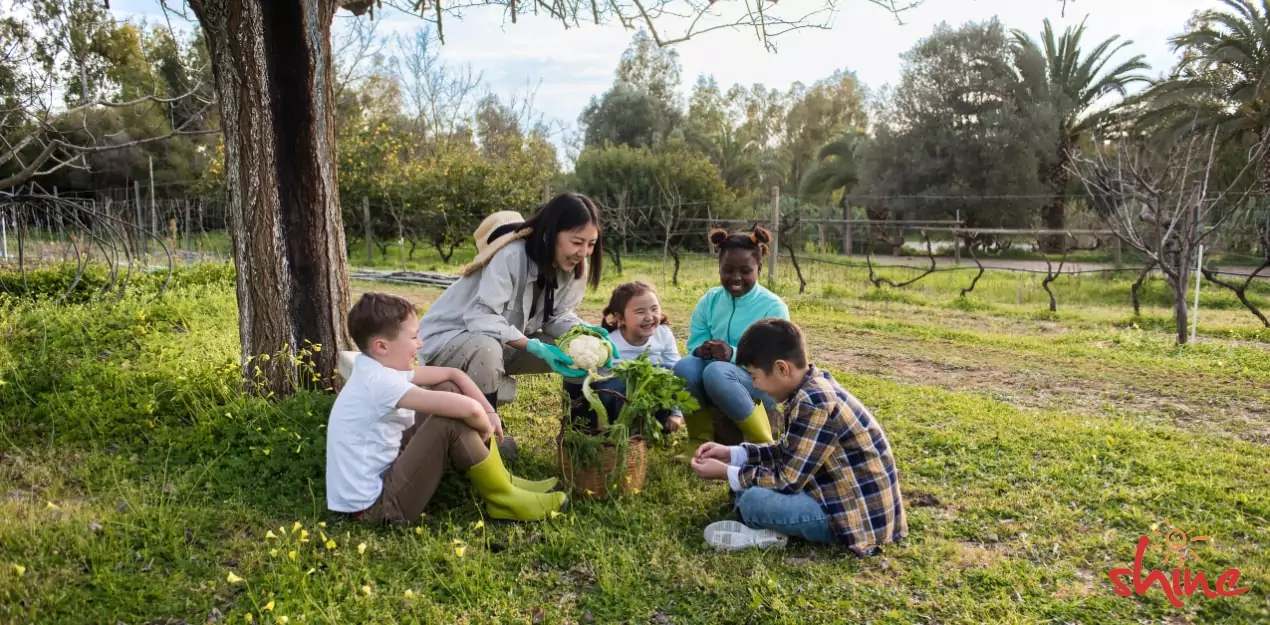Sustainability in childcare is more than just a trend; it’s an essential practice to ensure our children inherit a healthy planet. Discover key strategies and the importance of incorporating environmental stewardship into childcare settings.
This guide provides insights into actionable methods that teach our youngest citizens the value of living sustainably, preparing them for a future where they’re not just inhabitants of the Earth but its caretakers.
Key Takeaways
- Shine Early Learning adopts a multidimensional approach to sustainability in childcare, focusing on natural, social, political, and economic practices while emphasising environmental education’s importance through tools like environmental-themed books and engagement with the natural world.
- Sustainability practices at Shine revolve around three key pillars: reducing food waste through strategic meal planning and family-style serving, utilising natural materials to foster creativity and environmental awareness, and implementing water conservation techniques both in practice and education.
- A partnership between Shine and families extends sustainability practices beyond the childcare environment into homes. Shine provides educational programs, community events, and an environmental audit system to ensure continuous improvement and broader community engagement in sustainability.
Shine Early Learning’s Approach to Sustainability
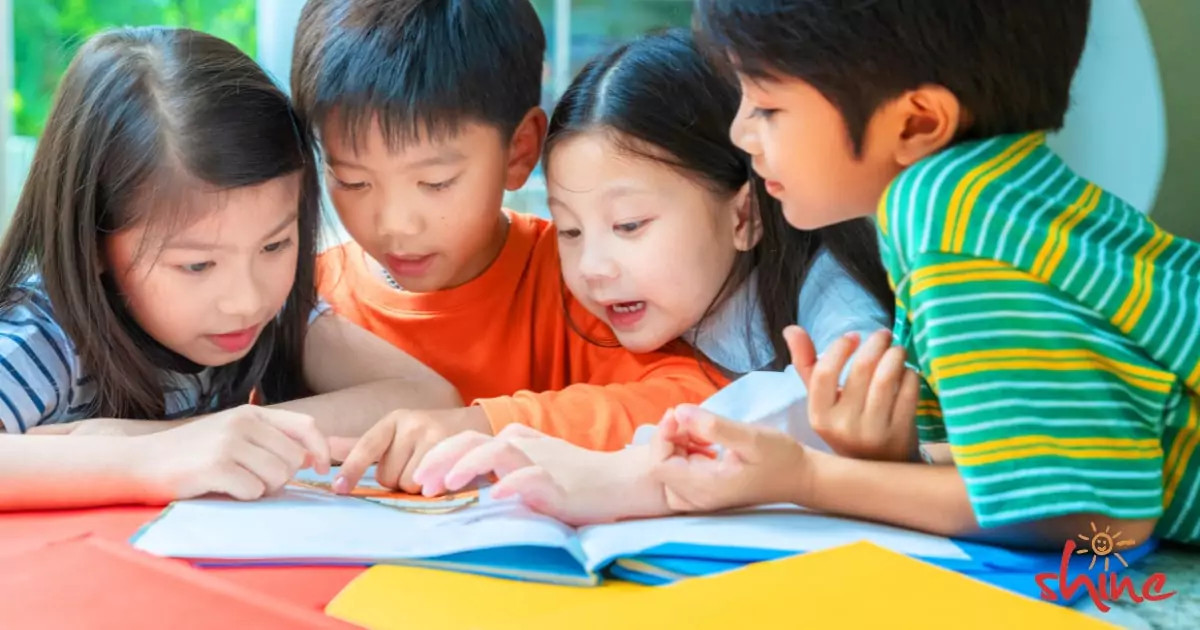
Shine Early Learning takes a holistic approach to sustainability, focusing on the following dimensions and integrating them across all service operations:
- Natural: gardening, introducing natural fibers, understanding environmental impact, water preservation
- Social: emphasising real food, using locally farmed ingredients
- Political: advocating for sustainable practices and policies
- Economic: supporting local businesses and suppliers
The center’s sustainability practices encompass environmentally responsible actions such as recycling and using sustainable materials.
Children at Shine are exposed to a variety of environmental-themed books which foster interaction with the natural world and illustrate the impact individuals can have on the environment. This approach to sustainability is rooted in the definition of sustainable development by the UN World Commission on Environment and Development, which emphasises the need to meet present requirements without compromising future generations’ ability to meet their own needs.
The Pillars of Childcare Sustainability at Shine
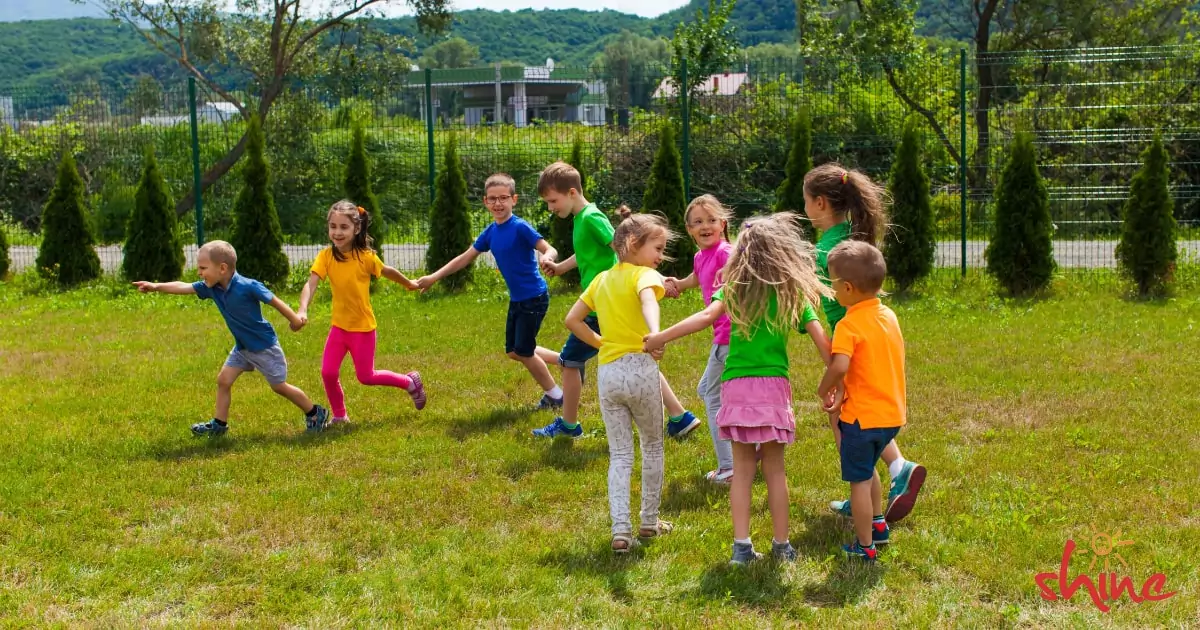
Reducing Food Waste with Home-Style Meals
Shine employs a unique strategy to reduce food waste. Through online tools like FoodChecker, Shine can plan meals accurately, determining proper portion sizes and ingredient quantities for children’s meals, effectively decreasing food waste. Another strategy employed is ‘family-style serving’. This approach allows children to serve themselves, fostering mindful eating habits and reducing food waste by learning to decide how much to eat.
In addition, Shine adopts various methods, such as incorporating leftovers and food scraps into soups, casseroles, and smoothies, along with quickly cooling and storing to prevent bacterial growth to manage and use leftovers effectively. Child educators guide children through experiences that teach them about reducing food waste, such as careful food purchasing to avoid excess and understanding the significance of eating what they serve.
Engaging Children with Natural Materials
Natural and recyclable materials are integral to the learning environment at Shine. They serve as the ‘third teacher’ in child education, adding complexity and variety to children’s play and supporting problem-solving, scientific inquiry, and numeracy skills.
These materials are incorporated into creative expressions such as art projects with scrap paper collages and storytelling with paper bag puppets that foster sustainability and resourcefulness.
DIY educational tools and musical instruments created from everyday recyclable items are used to develop problem-solving skills and fine motor skills and to instil an understanding of the importance of reusing resources.
Water Conservation in Action
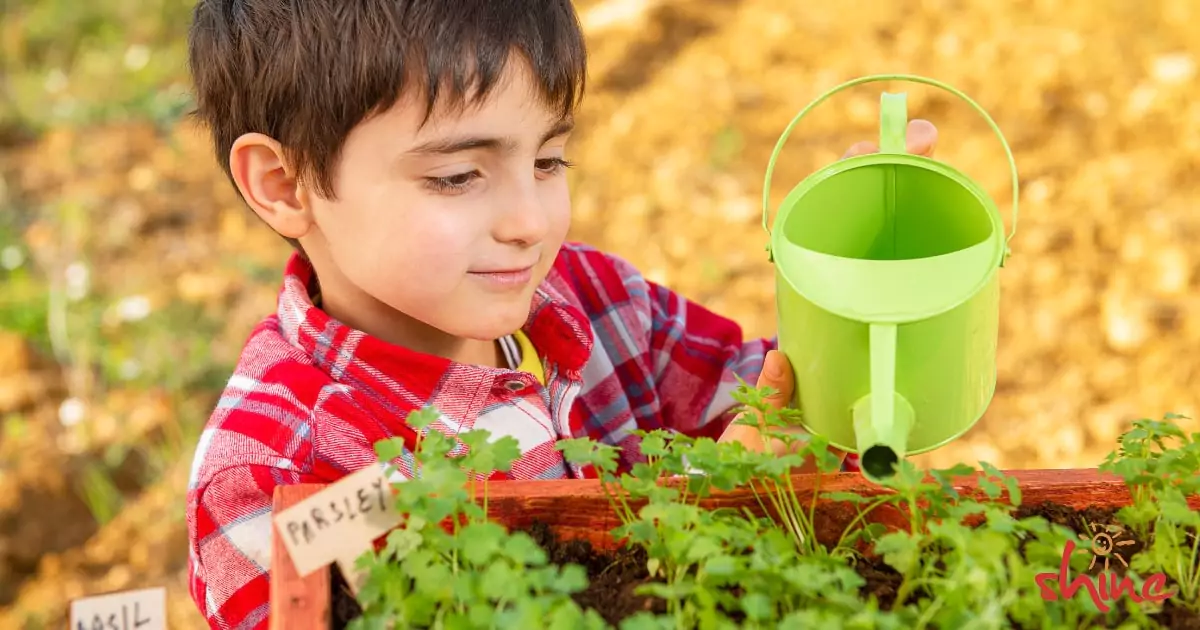
Shine’s commitment to water conservation is evident in their practical strategies and educational programs. They:
- recycle used water for garden irrigation
- use a fixed amount of water for play
- collect hand-washing water for reuse
- preserve rainwater collected in rainwater tanks in times of low rainfall
These strategies further emphasise the importance of water conservation practices.
Educating children about water-saving techniques is integral to Shine’s water conservation efforts. Children are taught to:
- Turn off the tap while washing hands
- Engage in discussions and book readings about the value and importance of water
- Learn about the challenges of accessing clean water in some communities and the importance of water conservation through the story ‘The Water Princess,’ inspired by the childhood of Georgie Badiel.
Creating a Positive Social and Emotional Environment for Sustainability
A positive social and emotional environment is essential for children’s sustainable development practices, personal well-being, and their capacity for joy and exploration. At Shine, we emphasise the following:
- The social and emotional aspects of learning
- Fostering fundamental values
- Respectful attitudes towards sustainability
- A sense of community
Shine adopts Social and Emotional Learning (SEL) programs aimed at developing core competencies such as:
- self-awareness
- self-management
- social awareness
- relationship skills
- responsible decision-making
These competencies are crucial for nurturing sustainability-minded individuals. Engaging with natural materials and fostering an ecocentric worldview contribute to developing a profound respect for living things and the natural environment, laying the groundwork for long-term environmental stewardship.
Shine’s Sustainable Menu: Nourishing Bodies and Minds
At Shine, the nutritious home-style meals served are not just about feeding bodies but also nourishing minds. The sustainable menus include a variety of grains and vegetable proteins, promoting nutritional variety and food security. Food choices are centred around fresh, locally grown foods with minimal chemicals and packaging and discussions that teach children to differentiate between hunger and the desire for food.
Mealtime at Shine is an opportunity for educational discussions. Stories with environmental themes are used to connect the stories to the origins and benefits of the organic foods being served. This approach fosters a comprehensive understanding of their food, promoting a sustainable mindset from a young age.
From Garden to Table: Educating Children on Organic Growth
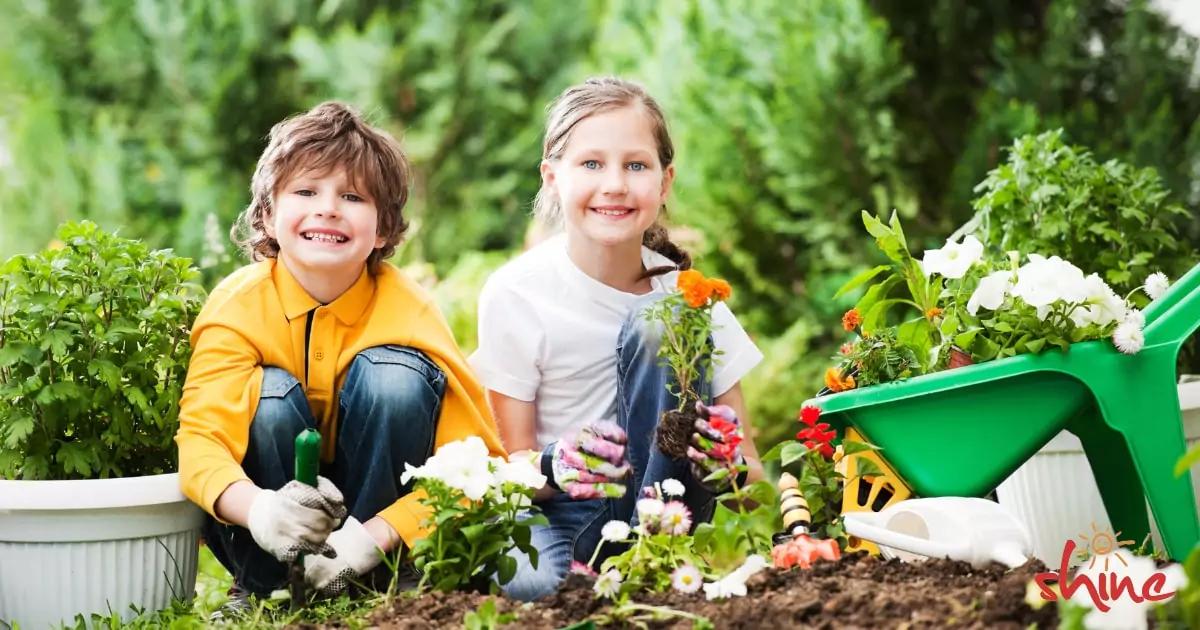
Activities like watering, planting seeds, and weeding encourage children to develop an appreciation for sustainability and nurturing the environment. Implementing compost bins and worm farms at Shine enables children to recycle organic food matter, teaching them about natural processes like decomposition.
The garden-to-table program culminates in a demonstration of the full cycle of food production, providing children with a practical and tangible experience of sustainability.
Partnering with Families for a Sustainable Future
Shine believes in the power of collaboration and actively partners with families to incorporate sustainability into their homes. We utilise newsletters and digital platforms to provide regular updates on their sustainability initiatives, keeping families engaged and informed. The newsletters include:
- Strategies for teaching children about sustainability at home
- Profiles of Sustainable Childcare Services
- Suggestions for outdoor activities to inspire families
Shine also encourages families to incorporate sustainability into their homes by:
- Distributing resources such as the ‘Energy Saving Checklist’
- Suggesting online meal planning for sustainable eating
- Celebrating events like creating a green wall together
This collaboration between educators and families fosters a partnership that empowers sustainable living both in the childcare environment and at home while also helping to educate children on childcare practices.
Shine’s Educational Programs: A Foundation for Environmental Responsibility
Shine’s educational programs form the foundation for instilling in children a sense of environmental responsibility. Their curriculum integrates sustainability into various aspects of children’s learning, promoting holistic growth across:
- Social development
- Physical development
- Emotional development
- Intellectual development
With daily practices and resources aimed at a sustainable future, we can embed sustainable practices into our routines.
Using natural materials in play and other educational activities, Shine implements role-model sustainable practices and discusses them with children, teaching critical concepts like recycling, reusing, and repurposing. As per the National Quality Framework, the programs are designed to help children develop confidence and foster a capacity to value, respect, and understand the interdependence between humans and the natural environment.
Local Community Collaboration for Broader Impact
Community collaboration is a key element of Shine’s sustainability strategy. They foster local collaboration to create sustainable environments and educate young learners and their families. Shine involves children in Earth Day activities such as recycling sorting games and scavenger hunts designed to raise environmental awareness.
Shine also encourages economic sustainability by organising family book and clothing swaps, enhancing community ties and promoting the reuse aspect of sustainability. Through these efforts, Shine effectively educates and engages the community in locally relevant sustainable practices, contributing to a broader positive impact on environmental sustainability.
Continuous Improvement Through Environmental Audits
Shine employs environmental audits to support the ongoing enhancement of sustainability measures. These audits, aligning with National Quality Standard (NQS) Element 3.3.1, assess elements such as:
- Water use
- Energy use
- Waste minimisation
- Chemical use
- Biodiversity
- Purchasing
These audits are conducted to enhance sustainability.
The environmental audit process evaluates current practices and identifies areas for improvement, supporting ongoing enhancement of sustainability measures. Sustainability checklists are used in audits to comprehensively review key areas, helping centres become aware of their environmental performance. Audit outcomes drive the development of strategies to reduce waste and consumption, involving stakeholders through policies and reflective questions, promoting continuous sustainability improvements.
Summary
To conclude, Shine Early Learning’s comprehensive approach to sustainability is shaping the future of early childhood education. By incorporating sustainable practices into every facet of their childcare services, from reducing food waste to teaching children about the importance of water conservation, Shine is setting the stage for a sustainable future. Their efforts instil a sense of environmental responsibility in children and extend to their families and the broader community. As we look towards the future, the importance of such initiatives cannot be understated, for these young minds will carry forward the mantle of sustainability.
Frequently Asked Questions
How can we teach sustainability to children?
Teach children about sustainability by involving them in activities such as caring for plants and animals and demonstrating how human actions affect the environment. Engaging in eco-friendly crafts like making recycled paper or building a solar oven can also help them understand sustainability more effectively.
What does sustainability mean for children?
Sustainability for children means inspiring them to respect the earth and its resources, encouraging thoughtful resource use and waste reduction, and ensuring enough resources are left for future generations. This can help protect the planet, its plants, animals, and natural resources.
What does the EYLF say about sustainable practices?
The EYLF emphasises that sustainability involves social and economic aspects in addition to environmental concerns. It encourages children to engage with concepts such as social justice and equity and highlights the importance of addressing the challenges faced by humanity and the planet.
What is sustainability in child care?
Sustainability in child care involves educating children about the environment, how systems operate, and the resources needed from the natural world for our survival. This includes promoting sustainable practices and instilling a sense of responsibility towards the environment from a young age.
What is Shine Early Learning’s approach to sustainability?
Shine Early Learning’s approach to sustainability is holistic, focusing on natural, social, political, and economic dimensions, integrating these across all service operations, engaging in environmentally responsible actions, and using environmental-themed books to educate children.


